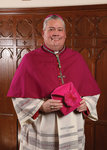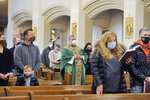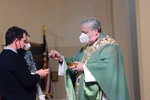


“I’m very understanding.”
So says Bishop John Sam Bonnici, reflecting on what was supposed to be a crowning moment of his altar boy years, being selected to carry a statue of the Baby Jesus in a Christmas Eve Mass procession that, to his shock, awkwardly went awry.
“We had a tradition at St. Ann’s,” he said of his family’s Manhattan parish. “One altar server was chosen every year to carry the Baby Jesus. It was this beautiful little porcelain statue.
“The year I had it, I was so nervous. We processed down the aisle and when we got to the sanctuary, there was a little step, and I missed the step.
“And the little baby went into the air, came down and just crashed into a thousand pieces,” he recalled.
“It wasn’t funny at the moment,” he laughed at his fourth grade mishap. “I never got that role again.”
At the time, “I thought the world had come to an abrupt end,” Bishop Bonnici said. But his pastor “was forgiving,” he said, “after we swept Jesus back together and they put a plastic doll in the creche. Every time I came into the church after Christmas, I knew why that doll was there.”
“That experience,” he said, “made me very patient and understanding with young altar servers and people in general. We’re all human.”
Bishop Bonnici, 57, has served since last July as pastor of SS. John and Paul and St. Augustine parishes in Larchmont.
He also was pastor of St. Columba’s, Chester, 2008-2021, where he took on responsibility for St. Mary’s, Washingtonville, late in his tenure, and St. Philip Neri, the Bronx, 2002-2008. His first parish assignment was as parochial vicar of Our Lady of Mount Carmel, Elmsford, 1992-1994.
He was director of the archdiocese’s Family Life/Respect Life Office, 1996-2002, which he also served as assistant director. He was also an adjunct professor of theology at St. Joseph’s Seminary, Dunwoodie.
A native of Manhattan, Bishop Bonnici is the son of immigrants, who are now deceased.
He was ordained in 1991 after studying for the priesthood at Pontifical Gregorian University in Rome. He holds a doctorate in moral theology from the John Paul II Institute for Marriage and Family at Lateran University in Rome.
To be an effective bishop, he said, it is essential “to be a very good, listening servant.”
Over the last three decades, he has had a variety of priestly assignments, he said, “and I’ve enjoyed them all, frankly.”
“Throughout all those experiences—as a priest, celebrating the sacraments, proclaiming God’s word and serving the needs of God’s people—the one thing that I’ve learned and cherish, and that’s why parish ministry is so important to me, is I know that every person I encounter has a story.”
Part of the role of a priest and all who are called to service, Bishop Bonnici said, is to “acknowledge that truth and then to take the time out and listen to the story, learn what that story is.”
“Once you embrace that story, you embrace the person. You get to know them better; it becomes a true encounter. Then you’re able to serve them more beautifully and bring God to them in a way that’s going to make a difference in their life.
“And every story is different, every story is unique. No one has the same story.”
Bishop Bonnici is looking forward to “basically giving God permission to use me as He has done in the past, for this new calling. And with His grace and help and guidance, through prayer, to do what is needed and to do it to the best of my ability. It’s a different role, it’s a new chapter, but the calling is similar, and it’s service to God’s people.”
He is pleased to remain a pastor after his ordination to the episcopacy. “It allows you to remain rooted in the ministry that encounters people on a daily basis,” he said.
Having served in diverse parishes—inner-city, rural and suburban—he has learned that “regardless of the setting, the people of God are the same as far as their love for the Church and their zeal to live out the faith.”
At the same time, he delights in discovering what sets each parish apart. “It just gives you a real appreciation for the diversity of God’s people.”
Bishop Bonnici is the younger of two children of the late John and Gertrude Bonnici. His father was born in Malta and his mother, a native of Romania, grew up in Germany. He has a sister, Erica, and a brother-in-law; three nieces, two great-nieces and a great-nephew. “They’re my source, my strength,” he said of his family. “We’re very close. My sister and I are incredibly close, we always have been.”
To his family he is known as Johnny and Uncle Johnny. Bishop Bonnici is 6-foot 3-inches tall. He speaks three languages: English, Italian and Spanish, and can read French.
He was baptized at St. Nicholas of Tolentine Church, the Bronx. A product of public elementary school, he attended religious education classes at the family’s home parish, St. Ann’s in Manhattan. The family later worshiped at Immaculate Conception in Manhattan.
Bishop Bonnici’s earliest memory of being in a church was at age 4 or 5, he said, and “helping” his mother light a candle at St. Peter’s Church on Barclay Street in lower Manhattan. A pastime he and his mother, who was Lutheran, shared in his childhood was visiting churches when they went on walks.
“It’s amazing what your brain retains,” he said, referring to “the smell of the church, the wax—they were real candles, not electric,” he quipped—“and incense,” which he surmises was from a Funeral Mass before their arrival.
Sharing his love of the sacraments, he said “the Holy Sacrifice of the Mass is the center to the priesthood.”
While he appreciates all the sacraments, the sacrament of reconciliation, he said, “is one of the most humbling experiences. It’s truly an encounter with the Lord and His penitent. You allow God to use you at that moment to bring peace to someone that is burdened by sin.”
“I’m always amazed, because there’s no preparation. When you’re sitting in that confessional, you have no idea who’s coming to see you. Yet, somehow, you’re always able to say the right thing. It’s not us saying it,” he said of priests, “It’s God saying it. It’s such a powerful moment for both the priest—in persona Christi—but also for the penitent. You always have to show God’s love and mercy. That’s paramount.”
He is mindful there will be many new responsibilities to which he will be entrusted as a bishop. “My brother bishops already have been amazingly wonderful and helpful,” he said, and Cardinal Dolan “extraordinary.”
“It’s really a continuation on a new level with the same goal,” Bishop Bonnici said, “and that is to help people, including myself, get to heaven.”